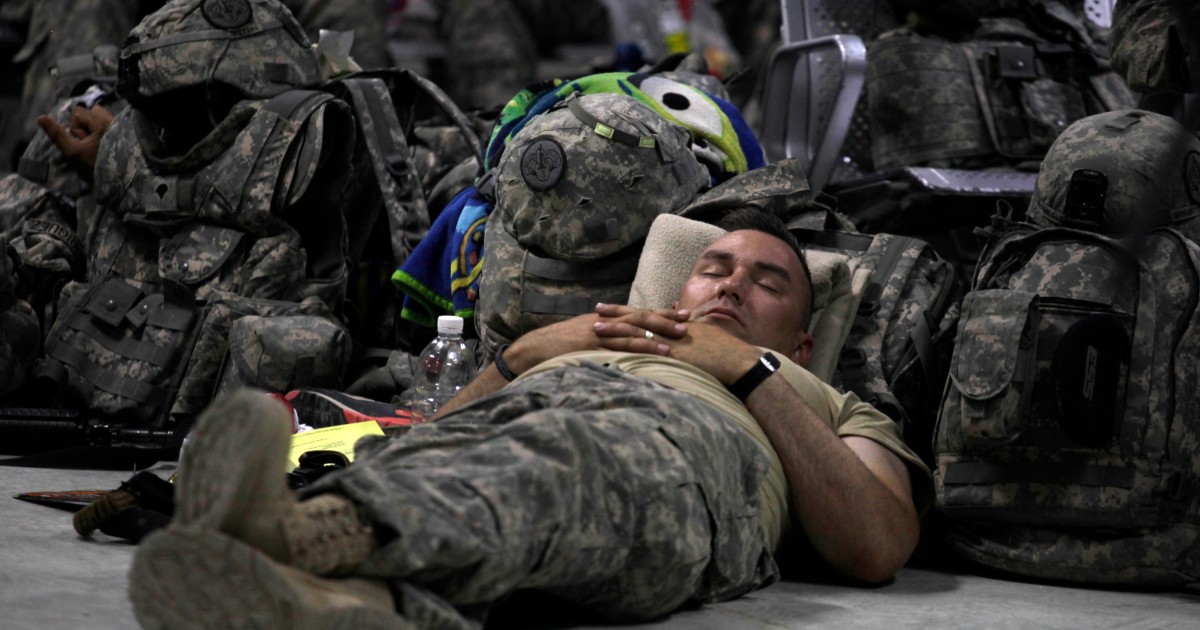Summer 2022
Effective Tactical Sleep Strategies
The Office of the Army Surgeon General recommends that soldiers sleep at least seven hours per night, although only a minimum of four hours is required during field training exercises.
In preparation for times when sleep may be hard to achieve, such as during a combat mission or overnight operation, soldiers are recommended to get at least nine hours of sleep ahead of time.
While not a long-term solution to the impact of chronic short sleep, “banking” sleep in this way may provide immediate, next-day effects which can improve soldiers’ effectiveness during a mission. Getting more sleep than usual (such as 10 hours) improves alertness and performance during a short period of sleep deprivation, and napping has been shown to lower heart rate and improve memory in athletes.
Due to the nature of military service, it’s difficult for many service members to sleep for seven hours, uninterrupted, so they end up taking naps when they can. Some may use the military sleep method, which was popularized in the book Relax and Win: Championship Performance. This military sleep method was used by World War II soldiers to fall asleep within two minutes.
Here’s How it Works:
- Start by relaxing your entire face, including your foreheads, eyelids, jaw, and tongue.
- Drop your shoulders and then your hands, letting them fall to either side of your body.
- Inhale and exhale to relax your chest.
- Then, progressively relax your legs, starting with your thighs and then your calves, ankles, and feet.
- Clear your mind for ten seconds. You might visualize a relaxing scene, like watching the rolling waves at a beach, being in a dark room, or swinging in a hammock looking at clouds in the sky. When thoughts come up, don’t get frustrated; just let them come and go. If visualization doesn’t come easy, try repeating “don’t think” to yourself over and over.
- Once you have relaxed your body and cleared your mind, you should be able to fall asleep.
Regulated Nap Times
In more recent years, the military has increased its focus on changing the military culture around sleep by providing service members with education about how sleep works and offering tips for better sleep.
In 2020, the Army updated its FM 7-22 Holistic Health and Fitness manual by expanding its guidance on sleep and promoting better sleep hygiene (such as following a consistent sleep schedule, finding a restful sleep environment to sleep in, and adopting a bedtime routine). The manual recommends service members take short, daytime naps during the afternoon to help them reach seven or eight hours of sleep over 24 hours.

Tactical Sleep by the Numbers
*Information provided by the March 2021 Pentagon report, Study on Effects of Sleep Deprivation on Readiness of Members of the Armed Forces.
76% of military personnel reported not getting the recommended 7-9 hours of sleep
60% of service members sleep fewer than 6 hours per night
U.S. Military Academy reports cadets average 5 hours of sleep per night during the week with interruptions
During training exercises, service members report less than 5 hours of sleep per night
Studies show a 15-25% decrease in combat effectiveness when soldiers get fewer than four hours of sleep per night
The Department of Defense recommends that when sleep deprivation is required for an operation, soldiers take “tactical naps” of 20 minutes, followed by caffeine. If they’re aware of a mission ahead of time, they should bank their sleep by sleeping extra hours beforehand. Leaders are supposed to provide quiet, restful sleep environments and enable those under their command to receive eight hours whenever possible.
» ALSO SEE: Tightness As A Symptom of Muscle Weakness
Challenges Soldiers Face in Sleep Hygiene
- Circadian Rhythms — It’s worth noting that many service members join the military during adolescence when the body experiences a circadian shift. When teens join the military after high school, they’re still operating on this delayed circadian shift, even though they’ve now entered an environment where 4:30 a.m. wake times are normal, as is getting fewer than six hours of sleep. Short sleep becomes normalized, even though it leads to negative health and performance impacts.
- Poor Sleep Environments — Due to the nature of their service, soldiers often have to grab sleep whenever they can get it and must fall asleep quickly even in loud, uncomfortable environments. Even low levels of noise during sleep can trigger a stress response, alter sleep architecture, and lower sleep quality — leading to daytime sleepiness, mood changes, and poorer cognitive performance.
Depending on their mission or duty, soldiers may be exposed to additional factors that impair sleep.
Military Culture — A 2021 Department of Defense report found that military members feel that they can control how much sleep they need, and tend to view needing sleep as “weak.”
The Department of Defense also approves caffeine as an acceptable stimulant for service members, who are more likely to consume it in higher quantities during combat. Problematically, soldiers may begin to overuse caffeine, especially those who perform shift work. As a result, they may have a harder time falling asleep at night.



